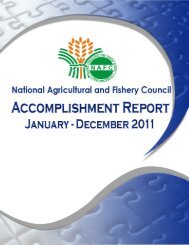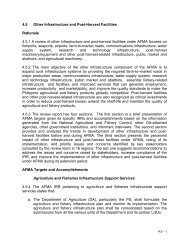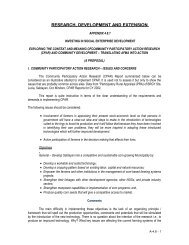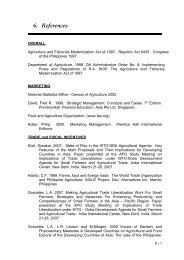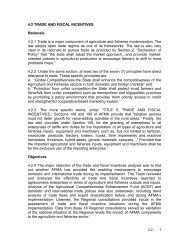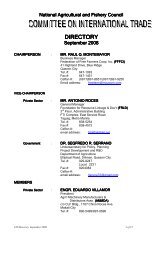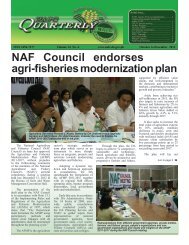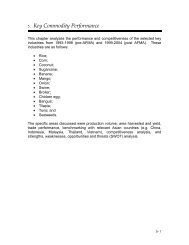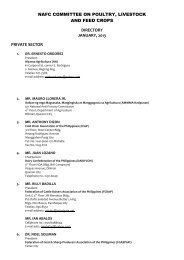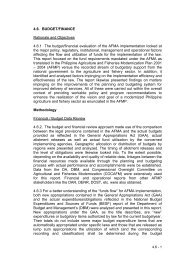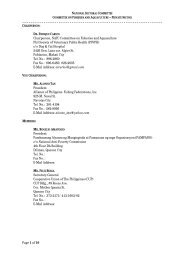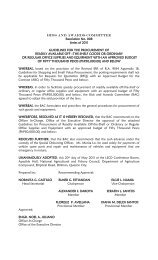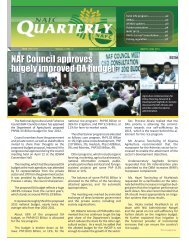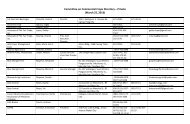EXECUTIVE SUMMARY - National Agricultural and Fishery Council ...
EXECUTIVE SUMMARY - National Agricultural and Fishery Council ...
EXECUTIVE SUMMARY - National Agricultural and Fishery Council ...
You also want an ePaper? Increase the reach of your titles
YUMPU automatically turns print PDFs into web optimized ePapers that Google loves.
(f) Revisit the implementation mechanisms of ACEF to separate the policy<br />
<strong>and</strong> oversight functions with the management /implementation of the<br />
facility. Some of the delays in project approvals in the past were due to<br />
unclear interpretations of these functions.<br />
(g) Trade issues should be integrated in the national development agenda,<br />
especially those related to poverty reduction, increasing productivity <strong>and</strong><br />
competitiveness, providing compensation <strong>and</strong> human development<br />
safeguards, <strong>and</strong> diversification of exports <strong>and</strong> markets. At the regional /<br />
international development levels, trade issues should build credible<br />
alliances, achieve fairer terms of trade, target technical assistance,<br />
strengthen the SDT provisions of the WTO Agreement, offer aid for trade<br />
<strong>and</strong> focus on human development.<br />
(h) To make trade work for human development (UNDP 2007) the following<br />
eight (8) point national agenda are recommended:<br />
• Invest for competitiveness – This implies public investment in<br />
infrastructures, human capital, R & D <strong>and</strong> ICT;<br />
• Adopt strategic Trade Policies – select strategic goods / services with<br />
great potential linkage with other industries;<br />
• Restore focus on Agriculture- agriculture should be the core of<br />
development strategy to combat poverty <strong>and</strong> food insecurity;<br />
• Combat Jobless Growth – Target agro industries that promote<br />
sustainable rural employment not for short term growth;<br />
• Prepare a new tax regime – progressive tax structure that doesn’t hurt<br />
the poor (customs tax, corporate taxes) should be encouraged to fund<br />
the process of adjustment under trade liberalization<br />
• Maintain stable exchange rate – realistic rates to encourage<br />
investments;<br />
• Persist with Multilateralism – avoid bilateral trade, go for multilateral<br />
trade arrangements; <strong>and</strong><br />
• Cooperate with neighbors- Regional Trade Agreements complemented<br />
with other forms of cooperation (e.g. financial arrangement).<br />
(i) Finally, since the findings on the general impact of AFMA are not as<br />
robust as envisioned by the law, revisiting the law’s IRR is in order,<br />
including a strong political will to provide budgetary allocation to the<br />
agriculture <strong>and</strong> fisheries sector to make it more competitive.<br />
4.3 Irrigation<br />
79. The Agriculture <strong>and</strong> Fisheries Modernization Act (AFMA), or Republic Act<br />
8435 was signed into law in December 1997. The law became effective in<br />
July 1998 when its Implementing Rules <strong>and</strong> Regulations (IRRs) were<br />
issued by the Department of Agriculture (DA). The effectivity of the law<br />
was for five years but in February 2004, its implementation was extended<br />
until 2015.<br />
xlii



